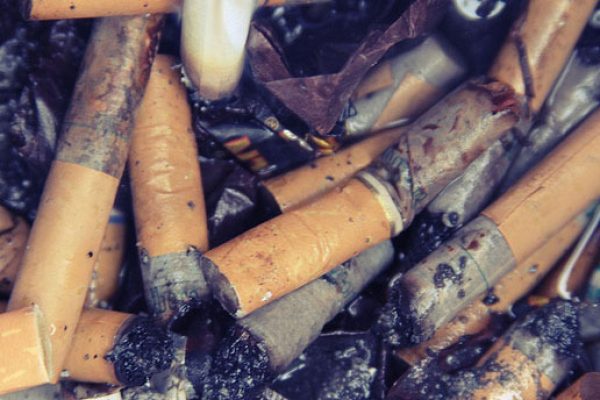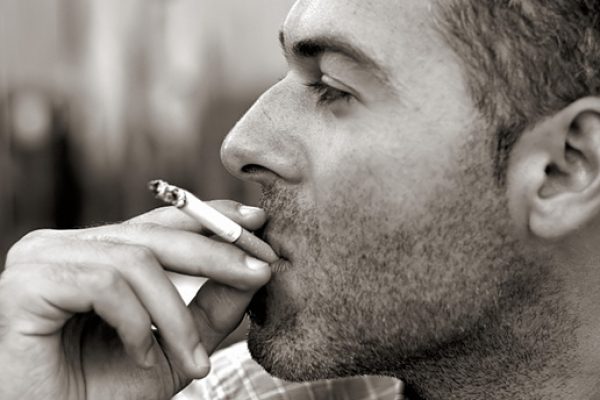What Actually Is This Stuff I’m Smoking?

In the battle to stop smoking it’s worth reflecting occasionally on what is actually in the smoke that we smokers inhale or share with those around us through passive smoking. Have a look at some of these ingredients and think - do you really want them pumping around your body?
Tobacco smoke contains around 4,000 different chemicals, many of them are poisonous and as we all know, some can cause cancer. Three of the main components of tobacco smoke are:
• Nicotine – a powerful, addictive drug which increases the heart rate, raises blood pressure and affects our mood and behaviour. It’s a sobering thought (or should be ) that nicotine is also used as an insecticide.
• Tar – which contains substances known to cause cancer and can also damage the lungs.
• Carbon monoxide – this gas takes the place of oxygen in the blood, making our lungs less efficient and stopping cells and tissues getting the oxygen they need to work properly. You may also recognise it as the poisonous gas found in car exhaust fumes.
There are a number of other chemicals in tobacco smoke which should also cause you to think twice before lighting up. These include:
• Benzene – a poisonous gas found in petrol fumes and linked leukaemia.
• Ethanol – commonly used in anti-freeze.
• Ammonia – used in many cleaning products.
• Formaldehyde – also used as an embalming fluid.
• Polycyclic aromatic hydrocarbon (PAH) – a cancer- causing chemical also found in diesel exhaust and other combustion products.
• Sulphuric acid – used in car batteries
• Hydrogen cyanide – an industrial pollutant
• Arsenic – do I need to introduce this one?
But, not only are we smokers slowly introducing this unpleasant cocktail of chemicals into our own bodies, we are also sharing it with friends, neighbors, colleagues and our kids. Medical experts suggest that there is no safe level of exposure to second-hand smoke as it causes indoor air pollution, worsens illnesses such as asthma for sufferers, and also increases the chance of cancers and heart disease for non-smokers breathing in the fumes. It is also worth noting that passive smokers breathe in smoke from the end of a burning cigarette or cigar which contains more toxins and nicotine than mainstream smoke.
Most of us realize that smoking isn't good for us. Our doctors tell us, our friends and family will tell us pretty much the same. But we carry on, either oblivious to the health risks or willing to gamble just because we need that hit of nicotine so many times a day. Take a look at some of those chemicals again though. And think about it.
Alternative Therapy – Give It A Try!

Everyone who has ever tried to quit smoking knows that it isn’t easy. There’s no quick and easy way of leaving the habit behind and not every method works for every smoker. But aside from the usual nicotine containing replacement options there are alternative therapies out there that just might work for you. (more…)
Quitting – It’s All In The Mind!

A recent study claims that mindfulness meditation could help smokers cut down their tobacco intake and could even encourage them to quit altogether. In fact, results showed that those who underwent training in meditative techniques smoked less one month later. Mindfulness meditation focuses the mind on the here and now, helps relaxation and encourages the person to just go with the flow of their thoughts and physical sensations. It's designed to help people to relax, concentrate on the current moment and, essentially, go with the flow of thoughts and sensations and encouragingly has been linked to a number of health benefits from cold and flu relief; hot flushes and IBS (irritable bowel syndrome), not to mention healthy changes within the brain itself.
Before we all reach for the saffron robes and incense burner, I should point out that the survey was based on a sample of just five smokers who provided feedback following their experience, so the results could be merely coincidental. Researchers however remain upbeat. Study co-author, Michael Posner, who is professor emeritus at the University of Oregon no less, maintains that the effect of meditation depends upon the brain-state the participant is in at the time.
This latest study involved two groups of smokers; one group underwent two weeks’ training in mindfulness meditation whilst the remainder were trained in relaxation techniques. At the end of the two week period, smokers were given breath tests to gauge how much they’d been smoking. The relaxation group showed no change whereas the mindfulness meditation group showed a reduction of 60% in their smoking. Four weeks after the study, five of the smokers in the mindfulness meditation group confirmed that they were still smoking less.
Interestingly, none of the participants knew that the study they were taking part in was actually devised to measure their smoking habits pre and post training. Other studies suggest that meditation improves connectivity within the brain and that the areas of the brain linked to self-control become more active, making it easier to say no to that cigarette craving. Meditation also reduces stress and researchers reckon that this may be another reason for its success in helping smokers quit. Meditation, unlike drug therapy, has no known major side effects and, once the initial training has been paid for, is free!
Check out these sites for some inspiration; http://marc.ucla.edu/body.cfm?id=22, http://www.shambhalasun.com/?option=content&task=view&id=2125
E-Cigarette Sales Now at $19 Billion

E-cigarette sales are expected to go beyond $19 billion in 2020 and can reach up to $25 billion. This is according to BBC.com in their article last September. Does this sound the death knell for big tobacco companies? Unfortunately, the answer may be no. (more…)
Stoptober Half Term Report – Fail!

I posted a few weeks ago that I’d be having a go at Stoptober this year so thought I’d give an update at the half way point. I’ve just received an email through from Stoptober staying well done and that 15 days without a cigarette is quite an achievement. (more…)
Natural Ways to Stop Smoking and Heal Your Body

In my last article here I wrote about herbal supplements which can help in the battle to stop smoking, as they are beneficial in treating the addiction to nicotine, and the other substances in cigarettes (lobelia, in particular, is chemically very similar to nicotine so it can safely be used as a non-addictive nicotine substitute). These herbs also help to reduce stress and promote calmness, which is one of the problems associated with quitting. (more…)
Smoking During Pregnancy and Bipolar Disorder

A recent study published in the American Journal of Psychiatry makes the alarming statement that there is a proven association between smoking whilst pregnant and the development of bipolar disorder (BD) by the children of smokers as they progress into adulthood.
The research was carried out using data collected during the Child Health and Development Study from 1959 to 1966. Of the 654 comparison subjects who took part in the study, 79 cases clearly showed that maternal smoking whilst pregnant doubled the risk of the women’s offspring developing bipolar disorder when they grew up. The project was a collaborative exercise undertaken by the New York State Psychiatric Institute, the Kaiser Permanente Division of Research in California and the Department of Epidemiology at the Mailman School of Public Health at Columbia University.
The chemicals and toxins produced by smoking tobacco during pregnancy are well known to be dangerous to the unborn child. Babies born to smokers often have a low birth weight and behavioural difficulties, including ADHD (Attention Deficit Hyperactivity Disorder). However, until now there has been no scientific research to suggest an association between smoking during pregnancy and bipolar disorder. Bipolar is a serious psychiatric disorder which causes mood swings characterised by bouts of mania and severe depression and does not usually manifest itself in sufferers until early adulthood or the late teenage years.
The study’s findings serve to emphasise the dangers of smoking during pregnancy and the wholly preventable dangers presented to the unborn child, many of which do not become apparent until that child is older. Other psychiatric disorders associated with tobacco exposure whilst in the womb include; ADHD (Attention Deficit Hyperactivity Disorder), CD (Conduct Disorder), ODD (Oppositional Defiant Disorder) and various substance abuse problems. Whilst not officially filed under exactly the same label as these disorders, bipolar does share similar clinical characteristics; inattention, loss of self-control, irritability and the proclivity to alcohol/drug abuse.
As if all that wasn’t bad enough, another study by the same group of experts found that pregnant mothers who smoke and also suffer from flu during their pregnancy have four times the risk of producing a child who would later go on to develop bipolar disorder.
So, if you’re pregnant and you smoke and you care about the health of your unborn child; quit. There’s no excuse.
*Image courtesy Flickr creative commons.
Will Smoking Harm Me And My Baby?

For many women having a healthy baby is something they dream of since their childhood. But for women who smoke this is not always the case. There are more than 10% of women who smoke throughout their pregnancies. Statistics calculate that 1 in 5 babies have low-birth weight, increased preterm deliveries and babies are 3 to 4 times more likely to die of SIDS(Sudden Infant Death Syndrome). Asthma among infants and young children has been linked to mother's who smoke and the odds of developing asthma is twice as high with children whose mothers smoke more than 10 cigarettes a day.
It is harder for women who smoke to become pregnant and they are more apt to have a miscarriage. One million babies are born each year worldwide to mothers who smoked during pregnancy. When a baby still in the womb is exposed to such dangerous compounds as nicotine, carbon monoxide and tar it can cause the womb to pull away from the uterine wall too early and cause bleeding which is dangerous for the baby and the mother. U.S. health care costs for newborns of mothers who smoke is estimated to be $740 per smoking mother or $366 million a year.
Babies that are born to women who smoke are much more likely to have birth defects such as cleft palate or lip, limb abnormalities, club feet, congenital heart defects, down syndrome, undescended testes in boys, abnormally shaped faces, missing or shortened arms and legs. And if both parents smoke the risk is even higher.
In a study published in the journal called Neuropsychopharmacology it reported that women who smoked while they had babies in the womb could give birth to babies with smaller brains(less grey and white matter) and that the baby would be more apt to be at risk for anxiety and stress. It is suspected that tobacco can affect the developement of babies by destroying neurons, arteries becoming clogged, and also reduce oxygen flow because of narrowing the blood vessels. Experts now believe that exposure to tobacco while a baby is in the womb can cause disorders psychologically from childhood to young adulthood.
Dr. El Marroun, of the Erasmus Medical Centre in Rotterdam, Netherlands said that 'The results of the current study in combination with the existing literature about the long-term effects of pre-natal tobacco exposure emphasize the importance of preventing and reducing cigarette smoking during pregnancy."
Many women are able to stop smoking when they become pregnant but those with mood disorders find it harder to do so. Experts have found that from one third to one half of pregnant women who smoke do have mood disorders. Finding help for depression is harder because of the fear of anti-depressant type medicines hurting the baby.
After the baby is born nicotine and other harmful materials from the tobacco smoke can be passed through the breast milk to the baby and affect it right way. Babies who are exposed tend to sleep less and are more apt to have colic. Breastfeeding is felt to be healthier than bottlefeeding. Breastfeeding provides many immunities that help the baby ward off illness.
There are several things a mother who breastfeeds and smokes may experience. These include lower milk production, early weaning, an interference with milk 'let-down'(milk ejection), prolactin is in lower levels, and in some areas iodine deficiency. It is important to smoke after breastfeeding never before.
Cigarette smoking and exposing second hand smoke to other people can both cause health issues. In the U.S. there are 88 million adults and children that do not smoke that are exposed to others smoke. There is no safe level of breathing in another person's cigarette smoke. Nearly 32 million children 3-19 are exposed to other people's smoke from cigarettes. To protect yourself and your family from smoke you must make some conscientious decisions. One is to ask people not to smoke around you and your family and making your home a smoke-free environment. Small babies should never be held by someone that has just smoked. Smoke permiates the clothing and can cause problems over time. Infants can develope asthma, get ear infections, eye irritations, allergy related illnesses, croup and SIDS in the very young. Make sure that day cares, restaurants, and places where you do business are all smoke free. Teach your children to stay away from smoke. If your children have respiratory conditions, if you have COPD or heart disease, and if you are pregnant, you are more in danger from the effects of smoke.
From just one day of not smoking your baby in the womb will be getting more oxygen. There is less of a risk that your baby will be born too early if you stop smoking. And you will have a better chance of that little bundle of joy coming home with you if you made the decision to stop smoking during your pregnancy. Quitting smoking within the first three or four months of pregnancy can lower the chances of a baby being born premature or having any health problems related to smoking. Not smoking will give you more energy after you give birth. You will breathe easier, food will taste better, and you will smell better. You'll have cleaner teeth, fresher breath, fewer skin wrinkles, no stain marks on your fingers, you will have a better sense of smell and taste, and more money to spend on your baby.
There are those who feel that changing their cigarettes to 'low tar', 'mild' or 'light' is a better choice during pregnancy. The less you smoke or are around smoke the better you and the baby will be. The best choice is to quit smoking completely so you will have both a healthy pregnancy and baby.
Thank you for reading my piece. I hope you will vote for it if you like it.
Casting the Magic Word that Will Stop You from Smoking

The crowd was hushed when the man on the stage raised his hands. Thousands of people bowed their heads in solemn silence as a solitary man knelt in front of him. Mustering all his strength and with a thundering voice he shouted "By the power vested on me; on my hands, I command you!" his hands were (more…)
How to Combat the “I’ll Just Have One” Lie

Have you caught yourself thinking, "I'll just have one"? This is one of the biggest lies people tell themselves when going through withdrawals. You feel stress or maybe your cravings feel worse than ever. It's easy to think that you'll only have one and that will take care of the craving. It's a harsh reality but giving in, even just once, is very likely to completely set back your progress. Having "just one" turns into "just one more" then "this will be the last one". It might be tough, but just tell yourself no. Instead, try out one of these techniques: (more…)






